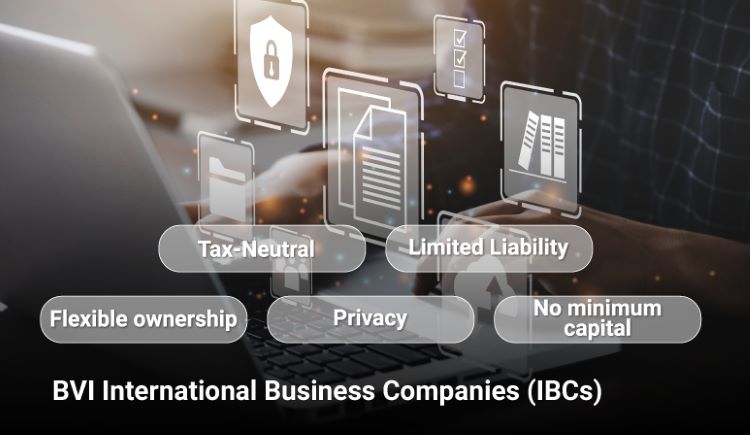The British Virgin Islands, due to their scant regulations, neutrality in taxation, and privacy, have managed to emerge as one of the most favorite offshore financial jurisdictions where one can incorporate a company. Within this jurisdiction, the most popular legal entity is the BVI International Business Company (IBC), but other types are also allowed. From conducting international business to holding assets to investments, the incorporation in BVI offers a number of advantages.
An overview of the BVI company types, an overview of the advantages for setting up a BVI IBC, and an outline of the requirements to set up a BVI company
BVI Company Types
There exist several BVI company types, suited for different purposes of course. The most popular one and the most used by foreign investors is the International Business Company. Below are the main BVI company types:
- IBCs: These are the most common type of company incorporated in the BVI and are widely utilized for international trade, investment, and asset protection. IBCs are extremely popular due to their flexibility and tax advantages.
- LLCs: A BVI LLC shares close similarity with LLCs in other countries. They can offer both the benefits of a corporation and a partnership, where owners enjoy limited liability and, where applicable, flexibility in management structure.
- Segregated Portfolio Companies (SPCs): SPCs are specialized companies used in insurance, mutual funds, or other investment funds. This structure allows the company to create separate portfolios, each isolated from the liabilities of the others, offering asset protection for different business segments.
- Public Companies: BVI public companies can issue shares to the general public, while in private companies, which are highly restrictive in nature regarding the aspect of ownership and governance. These have to meet more onerous reporting and disclosure requirements.
- Limited Partnerships: The most common investment vehicles set up in the BVI have been by way of limited partnerships, generally for investment in private equity, venture capital, or real estate. They give protection against liability to limited partners while their structure remains flexible.
- Private Trust Companies: These are primarily used in family trusts and estate planning. They give more control to the assets held in trust with simultaneous tax benefits and asset protection.

The main BVI company types include BCs, LLCs, SPCs, and LPs
BVI International Business Companies (IBCs)
The most modern structure in the BVI jurisdiction, particularly for attracting individual and corporate business that seeks to apply its resources in cross-border transactions, is the BVI International Business Company, or IBC. IBCs are designed for offshore operation, meaning they are not subject to any kind of BVI taxation on income that accrues outside the territory.
The main features of the BVI International Business Companies include:
- Tax-Neutral: IBCs are not required to pay corporate tax, capital gains tax, or withholding tax. They enjoy BVI's tax-neutral status, and hence IBCs are suitable for all kinds of international business.
- Limited Liability: The shareholders' liability is limited to the amount they contributed towards the company's capital. This means their personal assets are safe from the liabilities of the company.
- Flexible ownership: A BVI IBC can have a single shareholder and a single director, and neither is required to be a resident. They can therefore be anywhere in the world.
- Privacy: The names of the shareholders and directors do not form any part of the public record; hence, confidentiality and privacy are duly protected.
- No minimum capital: There is no such requirement concerning minimum capital, and as such, the company operates with such capital deemed necessary for it.

BVI IBCs provide privacy, flexibility, and tax efficiency
BVI Company Benefits
Incorporation of the company in the British Virgin Islands offers numerous benefits, attracting international businesses and high net-worth individuals. Some of the key BVI company benefits include:
- Tax Efficiency: BVI is a tax-neutral jurisdiction; hence, there are no corporate taxes, no capital gains taxes, and no estate taxes for BVI companies. This is ideal for incorporation for holding companies, international trade, and investment purposes.
- Privacy: One of the most attractive features of BVI companies is the very high level of privacy accorded. Neither the identity of the shareholders nor that of the directors is disclosed to the public, thus shielding them from public scrutiny. This, indeed, plays a very positive role when it comes to factors of privacy for persons seeking secrecy in their business operations.
- Ease of Incorporation: Setting up a BVI company is relatively easy, with minimal bureaucratic processes and processing times. Most BVI companies can be incorporated within 1-2 business days, placing it among the top fastest jurisdictions for company formation.
- No Currency Restrictions: The BVI companies can conduct any kind of transaction in any freely convertible currency. They can even maintain bank accounts in numerous different currencies. This accessibility makes it one of the major advantages to international businesses with operations in many countries.
- Asset Protection: The BVI legal framework has immense protection against creditor claims. This makes the jurisdiction highly attractive with regard to wealth management, estate planning, and the protection of assets against potential litigation.
- International Recognition: Companies in the BVI enjoy recognition and acceptance across the globe; therefore, they are able to execute business in almost all countries. The reputation of the BVI as a soundly regulated and stable jurisdiction adds capital into businesses incorporated in this territory.

BVI company benefits include tax neutrality, privacy, and flexibility
BVI Company Requirements
While the BVI maintains a friendly regulatory environment, there are certain requirements for maintaining a company in good standing. The following constitutes major BVI company requirements:
- Registered Agent and Office: Each BVI company should have a registered agent and a registered office in the BVI. The registered agent shall be the official contact point of the company with the government of the BVI and is responsible for filings that are required for compliance.
- The minimum number of directors and shareholders required for a BVI company is one, and either corporate or individual entities can be considered for this. No restriction, however, is there concerning the nationality and domicile of a director or a shareholder. The particulars regarding these are not publicly available, thus ensuring privacy.
- Annual Fees: The BVI company is obliged to pay an annual fee to maintain itself in good standing with the BVI government. The fee charged will be dependent upon the authorized share capital of the company. It usually ranges in the region of $450 for companies having share capital up to 50,000 shares, while it may go above $1,000 for larger share capital.

BVI company requirements include a registered agent and records
- Record-Keeping Requirements: Even though the BVI companies do not need to file any public financial statements, they are required to maintain adequate financial records that accurately reflect the financial transactions of the company. These can be kept in or outside BVI but must be made available upon request for inspections.
- Economic substance: Banking, insurance, fund management, and holding companies for intellectual property, among other activities related to BVI companies in recent years, have an obligation for economic substance. It means they should be capable of demonstrating their operations are actually conducted within the BVI-for instance, evidence of a physical office or staff employed.
- Annual Compliance: Although the BVI companies are not required to file financial statements, they have to file an annual return with their registered agent by confirming their compliance with the local legislation. It is a return containing basic information about the company's directors and shareholders, along with a declaration by the company that it has maintained proper books of accounts.
Conclusion
Selecting the right BVI company types is crucial for business success. Options like Business Companies (BCs), Limited Liability Companies (LLCs), Segregated Portfolio Companies (SPCs), and Limited Partnerships (LPs) offer various benefits, including tax efficiency, privacy, and operational flexibility. Understanding these BVI company types helps businesses optimize their structure, enhance asset protection, and comply with international standards, ultimately supporting effective global operations.




